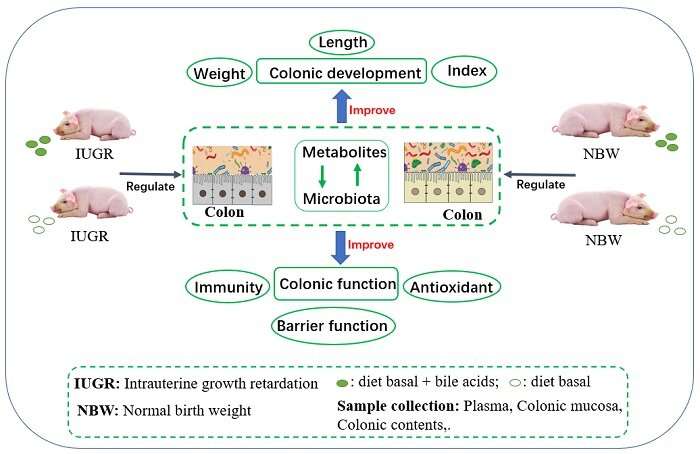Bile acid improves intrauterine growth retardation metabolism in piglets

Intrauterine growth retardation (IUGR), defined as the impaired growth and development of a mammalian embryo/fetus or fetal organs during pregnancy, is a major concern in pig farming. IUGR animals exhibit impaired growth and development, lower meat quality, and higher morbidity and mortality after birth. Therefore, IUGR is a major problem for the pig industry due to the lack of comprehensive understanding of the growth regulation mechanism of IUGR piglets.
Kong Xiangfeng's research team from the Institute of Subtropical Agriculture of the Chinese Academy of Sciences has systematically investigated the growth and development, body metabolism, and intestinal microecological profiles of normal birth weight pigs and IUGR pigs at different growth stages.
Combining fecal microbial transplantation and germ-free mice, the researchers verified that IUGR alters the diversity and metabolic pathways of the intestinal microbiota, resulting in abnormal intestinal energy, amino acids, and bile acid metabolism, which hinders the later growth and development of IUGR pigs.
The application of dietary bile acid showed that bile acid supplementation can improve liver function, enhance the relative abundances of potentially beneficial bacteria in the intestine, and alleviate intestinal mucosal oxidative damage of IUGR piglets.
In addition, dietary bile acid supplementation can also improve the colonic barrier function and redox status of IUGR piglets, which is beneficial to intestinal health.
These findings suggest that the intestinal microbiota can be used as targets for regulating IUGR, and bile acids play an important role in improving IUGR metabolism and maintaining intestinal health in piglets.
The latest research is published in the Journal of Animal Science and Biotechnology, Frontiers in Microbiology, and Frontiers in Nutrition.
More information: W. Zhang et al, Gut microbiota of newborn piglets with intrauterine growth restriction have lower diversity and different taxonomic abundances, Journal of Applied Microbiology (2019). DOI: 10.1111/jam.14304
Liang Xiong et al, Intrauterine growth restriction alters growth performance, plasma hormones, and small intestinal microbial communities in growing-finishing pigs, Journal of Animal Science and Biotechnology (2020). DOI: 10.1186/s40104-020-00490-x
Yang Liu et al, Intrauterine growth retardation affects liver bile acid metabolism in growing pigs: effects associated with the changes of colonic bile acid derivatives, Journal of Animal Science and Biotechnology (2022). DOI: 10.1186/s40104-022-00772-6
Wu Tang et al, Metabolome, microbiome, and gene expression alterations in the colon of newborn piglets with intrauterine growth restriction, Frontiers in Microbiology (2022). DOI: 10.3389/fmicb.2022.989060
Yang Liu et al, Dietary bile acid supplementation alters plasma biochemical and hormone indicators, intestinal digestive capacity, and microbiota of piglets with normal birth weight and intrauterine growth retardation, Frontiers in Microbiology (2022). DOI: 10.3389/fmicb.2022.1053128
Yang Liu et al, Dietary bile acids supplementation modulates immune response, antioxidant capacity, glucose, and lipid metabolism in normal and intrauterine growth retardation piglets, Frontiers in Nutrition (2022). DOI: 10.3389/fnut.2022.991812
Journal information: Frontiers in Microbiology
Provided by Chinese Academy of Sciences




















